Michael Moreci's Blog, page 5
June 27, 2016
Five Sci-Fi Things I'm Currently Loving
I've been on quite the hiatus from this blog, attending to all sorts of new, exciting projects. For starters, I've been chugging along on the first book of my series of sci-fi adventure novels, hitting the halfway point last week. I've also been writing a number of DC projects, include Suicide Squad: Most Wanted, which hits stores this August. I've got a good deal of other things rolling in the DCU, I just can't talk about them quite yet.
In the spaces between all this work, I've occasionally had time to pick up a book, watch a show, or read a comic. As I have a nice window to come up for air, I figured I'd share five things that I've found to be especially noteworthy (and that prove that I sorta still live like a human being and not just a writer monkey). So, let's go to the list!
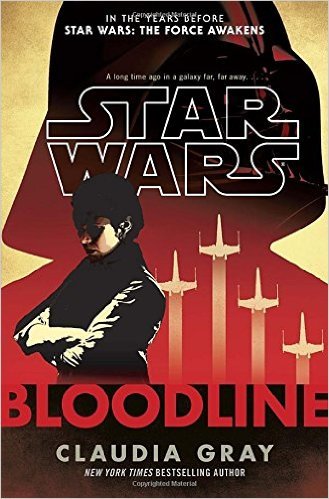
1. Bloodline by Claudia Gray: Can I first, just for a moment, take this opportunity to express how much I love Claudia Gray? Where do I even start?
First of all, her YA series, Firebird, is amazing. It's fun, exciting, and filled with the perfect amount of sci-fi and adventure. Gray's characters--whether in her own fiction or in the Star Wars universe--leap off the page, and are immediately endearing, complex, and immensely likable, and A Thousand Pieces of You (the first book in the Firebird series) is Gray at her best.
Also, about Gray--she may have written my favorite Star Wars book of all time with Lost Stars, and that's saying quite a bit, as I've read A LOT of Star Wars books. Lost Stars has everything I want from a Star Wars story, and I never thought it could be equalled until...
Bloodline. Someone once said how The Force Awakens is practically a miracle, in terms of how well it rivals the original films, how many things it gets right, and the sheer number of perfect moments it captures. I agree, and I feel similarly about Bloodline. Gray manages to do the unthinkable, and that's make Star Wars politics riveting (and also salient to our current political climate). Don't get me wrong, I love the prequels. I'll defend them any day of the week and twice on Sunday. But, I don't think they managed to capture the Star Wars political world in the way they were intended to. Bloodline, though, completely nails it--the story is crisp, clear, and captivating. And the handling of Leia's character couldn't have been better if Leia had written this book herself. There's a simple conceit at the heart of this book--and I won't give it away--but Gray handles it with absolute perfection, delivering a moment all fans have probably wondered about but never thought they'd see play out.
I can't recommend Bloodline, or Gray's work enough.
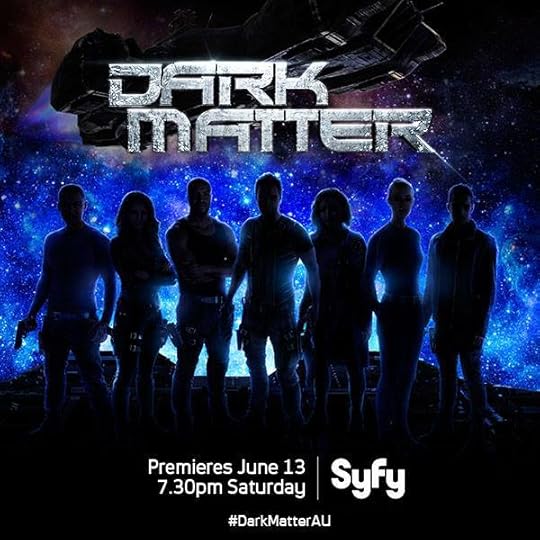
2. Dark Matter on SyFy: With the season two premiere right around the corner, I've gone back for a rewatch of season one, and I've found it even more satisfying than the first time around. What I might love most about this show is that there's the right amount of sci-fi campiness to it that the cast and crew fully embrace. While it has plenty of gravitas, the show allows itself enough humor to find this unusual sweet spot between a Saturday afternoon syndication romp and prestige sci-fi. What's really great is that both aspects catch you by surprise. Dark Matter starts as an incredibly well-executed thrill ride, but it evolves into something much more, taking some really interesting twists and turns along the way. The cast does a tremendous job rolling with the places the story leads them (which I won't spoil here), and it's refreshing to see writers willing to take some big chances that lead to some interesting and original places.
Season two starts in July, I believe, and the first season is streaming on Netflix.
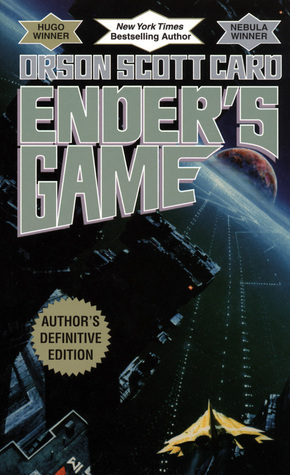
3. Ender's Game by Orson Scott Card: Somehow, I totally missed this book as a kid. Had someone given it to me when I was 13, i probably would've read it 50 times by now (that distinction is reserved for Slaughterhouse-Five). I'm only halfway through the book, and I'm already feverishly trying to plot when I can carve out time to read more books in the series (though I'm not at all sure if they're any good). I'm fascinated by Ender, and I want to immerse in his world--I can't help it that I'm a sucker for "but what's really going on?" stories. So much of it feels authentic, from Ender's experiences to the power struggles between the students to the world they're inhabiting. And Peter's ambition to rule the world through the manipulation of rhetoric and political gamesmanship couldn't come at a more relevant--and frightening--time.
I'm probably not opening anyone's eyes with this selection, as I may be the oldest nerd ever to read it for the first time, but for what it's worth, I'm enjoying Ender's world.
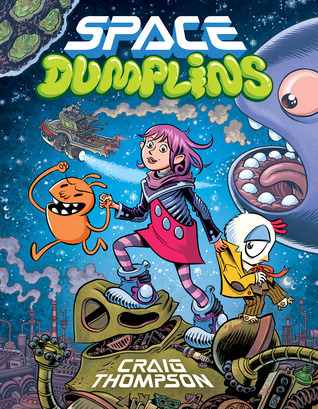
4. Space Dumplins by Craig Thompson: I picked this up for my oldest son, and I think I ended up enjoying it more than he did (though our enjoyment of the fart jokes in the story was neck and neck). I love this kind of story, and I wish there was more of it. It hit all the right notes concerning family, friendship, loyalty, overcoming fear, overcoming the odds, all those evergreen story beats and themes that, when done right, can make a story soar. And Craig Thompson, to say the least, does so much right in this book. The story itself, centering on one girl's journey through the galaxy to find her father, is incredibly rich and imaginative, with great characters and some wonderful heartwarming moments. And Thompson's art--I can't even begin to praise his craft enough. Every moment pops off the page with exuberance, making it a joy to read.
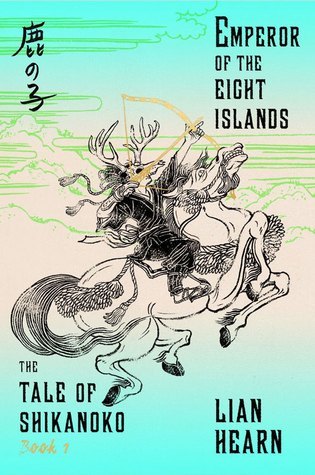
5. Emperor of the Eight Islands by Lian Hearn: Okay, this technically isn't sci-fi, it's more fantasy/folklore/myth, but WOW is it good. I picked this book up without knowing a thing about it--I think what drew me to it was the stunning cover (I know, I know, books and covers), which is nearly identical in design to one of my favorite book series in recent years, The Southern Reach Trilogy--and I'm thrilled that I did. In a nutshell, the book concerns a diverse cast of characters in feudal Japan, all vying for their lands and empires amidst significant turmoil. There's magic, there's warfare, there's mystery--it feels like an epic poem, swordplay, tragedy, and all. It has rich characters and Hearn does a masterful job building her universe and tying a lot of plot threads together into one mesmerizing whole.
Emperor of the Eight Islands is the first book in a series, and I can't recommend it higher. Book two was released about two weeks ago, and it's sitting on my shelf, begging to be devoured.
April 24, 2016
Retailers: Working for you and rewarding you
Selling comics isn't easy.
That's the no-brainer statement of the year, right? We know that all too well. When it comes to comics, we're looking at a comparatively small group of readers that tend to have very particular, and habitual, tastes. That's why selling new comics is especially difficult, like squeezing-a-watermelon-through-a-chain-link-fence difficult. You gotta push really hard.
But, new comics are essential to the business of comics. They're the most effective way to expand sales, whether through getting current readers to adopt a more robust reading list or bringing in new readers altogether with a different genre or offering. But, again, they're difficult because they involve risk. Risk for the creators to make, retailers to order, and readers to buy.
In my opinion, retailers are risking the most in this equation. You are, and I mean this without an ounce of hyperbole, the lifeblood of this industry. Retailers are on the front line of comics, taking financial risks every single week in order to literally keep the medium alive. Your job isn't easy but, like creators, you are driven by your passion for comics and your insistence, beyond all reason (also like creators), to stay committed to this amazing medium. For that—for keeping comics alive through your love and dedication—I thank you.
Because I know your job isn't easy, I'm here to tell you that, for my upcoming series, INDOCTRINATION, I'm doing every single thing I can to make it easier. The entire team behind this book—Z2, Superfan Promotions, and co-creator Matt Battaglia—have been working tirelessly to make Indoctrination the book that you, retailers, want. Let me tell you how:
Let's start with the basics—first, we've been promoting the shit out of this book. Here's a rundown of press outlets that have already covered Indoctrination in one form or other:
The Hollywood Reporter
Bleeding Cool (twice)
Comics Alliance (twice)
Den of Geek
Multiversity
SKCHTD
Forces of Geek
There's more I'm sure I'm forgetting. And, believe me, we're just getting started. Also, because the book is political in nature, Matt and I have cross-promoted with websites like Free the People and Waging Nonviolence, who combined have a social media presence of nearly one million people.
One of the greatest tools we have for promotion is a trailer—an amazingly eerie trailer—that the folks at Z2 cut together. Give it a spin and feel free to embed into your own newsletters and websites:
So, what else are we up to? Well, quite a bit. There's advertising. Matt and I have taken ads on comics websites as well as on Twitter and Facebook. We've made a FCBD story, brand new content not in the any issue, that will be seen far and wide come May 7 (a day after orders for issue #1 are due, as luck would have it).
And, as an added bonus, we're told the book is actually pretty good. Here's a taste of what's been said about it so far:
"Intense and atmospheric...INDOCTRINATION is True Detective meets The Master -- where the most powerful force in the world is belief, and that power gleefully corrupts."
--Stephen Orlando
Writer, Midnighter, Virgil
"INDOCTRINATION hits that sweet spot where surreal creepiness and very real world horror dance around one another in way that convinces you that something ghastly is unfolding just underneath the skin of the comfortable world you know and love."
--Cullen Bunn
Writer, Harrow County, The Sixth Gun
“Brilliant, cerebral, and deeply philosophical...one of the best first issues I've read in a long while. I can't wait to read more."
--Curt Pires
Writer, The Tomorrows, Pop
"Welcome to your new addiction...It's a page-turner that will suck you in completely. "
--Spartantown
“Indoctrination is a living, breathing testament to the depth and intelligence of Moreci as a writer...it's a fascinating, gripping series which comes highly, highly recommended."
--Big Comic Page
Not too bad, right?
One other thing—for all our piece of mind, this book is perfectly on schedule. By the time we send issue #1 to the printers, we'll be wrapping up issue #3. We're not disappearing, we're not delivering late. This book will be on the shelves exactly when we say it will. And speaking of, have you seen the cover to issue #3? If you haven’t, well:
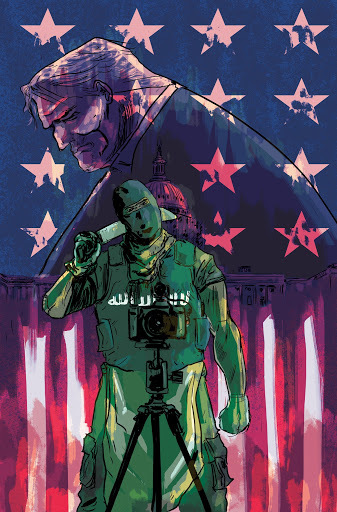
BTW, some of you have already gotten our PDF combining issue #1 and the first half of #2; if you didn’t get it but want to, just drop us a line, and we’ll get it right to you.
Here's what we're asking of you—meets us halfway. Hell, meet us a quarter of the way. We're making it so people will know about this book when they walk into your shop. They'll know what it's about, they'll know it's quality. We're asking you to stock it, share our confidence, and give it the nudge it needs to put our work over the top. And not only are we diminishing your risk as much as we possibly can, we're going to reward you for partnering with us. Check this out:
--For every 10 copies you order, you get a limited edition poster
--For every 25 copies you order, we'll send you two limited edition prints
--For 50 copies, you get a t-shirt and five prints
--For 100 copies, you get 10 prints and five t-shirts
--For 500 copies, we'll hook you up with 25 prints, 15 t-shirts, and your own variant cover that's part of a series of covers inspired by serial killer movies
So, you sold yet? Are you Indoctrinated?
Good. Now let's work together to sell some comics and reap the mutual rewards.
If you want to know more about Indoctrination, contact me via social media or my email (which most of you have), or visit indoctrinationcomic.com.
That you, again, for all your terrific work. I wouldn't be making comics or even writing this letter without you.
March 31, 2016
DON'T PREORDER MY NEW COMIC
We all know the drill, right? Wednesday = New Comic Book Day. It's the thing that gives Wednesday a higher calling, other than being the middle child that throws off the week's symmetry. Lots and lots of comics arrive in shops, online, and digitally every week without fail. It's one of the most magical things about the comic book industry—consistency, for one thing, and the promise that, hey, if the comics you bought didn't work out, new ones are right around the corner.
In a few Wednesdays, a new comic of mine will be joining the multitudinous rush to the stands—INDOCTRINATION, coming at you June 22 from Z2 Comics. I've posted about it here, and you can read the description of our first issue over at Comics Alliance.

Now, here's the part where I'm supposed to get all hot and heavy about preordering comics. How important it is to the series, that it's life and death for the creators, etc etc etc until we're all confused, bored to tears, or just sick of hearing about it. I can tell you something that everyone in comics knows: the system for getting a comic ordered—and thus determining the print run—and into comic shops is a cumbersome and ridiculous one. There's a whole slew of reasons why, but I can assure you that you'd find it very hard to find a comics pro that says “You know what? This system of ordering and distribution is really serving the medium in the best way possible.” I truly loathe the phrase “it is what it is,” but that's really all you can say here. It's the system, and it ain't changing anytime soon, so we all just have to deal with it.
That said, I'm not going to tell you to preorder INDOCTRINATION. I'm not going to make some clever “how to” that gives step-by-step instructions on how to ask your comic shop for a book that won't be out for some ten weeks. I'm not going to ask you to waste your printer's ink printing out some full color order form. I'm not doing any of it.
Like I said, the whole system of preordering and final order cutoffs and all the rest is silly and outdated (if it ever was IN date), and I won't be shifting that burden onto readers. Getting INDOCTRINATION ordered and on shelves is Matt's and my job. It's Z2's job. It's not you, the reader's, job. You just want to have a good time reading good comics. And that's what I want you to do.
INDOCTRINATION #1, if I can say so, is a good comic. I'd even say that you'll be really happy you picked it up. In fact, I bet you'll be SO glad, you'll even buy issue #2. People who've already read issue #1 seem to like. Like...
"INDOCTRINATION hits that sweet spot where surreal creepiness and very real world horror dance around one another in way that convinces you that something ghastly is unfolding just underneath the skin of the comfortable world you know and love. First rate fear from Moreci and Battaglia!"
--Cullen Bunn
Writer, Harrow County, The Sixth Gun
"Indoctrination is a brilliant, cerebral, and deeply philosophical comic that dedicates itself to exploring the depths of the human psyche, brought to us by two creators firing on all cylinders. Simply put, one of the best first issues I've read in a long while. I can't wait to read more."
--Curt Pires
Writer, The Tomorrows, Pop
“Bloodshed and making things go bump in the night is easy— Portraying the real terror we feel is not. It’s not the monster, it’s what the monster changes inside of us. True horror always comes from within, and Indoctrination has found a way to make that happen both figuratively and literally. That’s some transcendent spooky shit.”
--Seth Sherwood
Writer, Leatherface
So, here's what I ask of you:
1. Click on this link and snag a nice PDF preview of INDOCTRINATION #1. (And, if the mood strikes, you can also sign up exclusives and more on the INDOCTRINATION website).
2. Buy issue #1 when it release on June 22. If you like it, THEN tell your shop. They'll stock #2 for you.
That's it.
And, look, if you can't get it at your shop, you'll be able to get it online through the INDOCTRINATION website, my store, or Matt's store. You can get it digitally. And if all else fails, the files aren't going anywhere. We can always print more. It's 2016 for goodness' sakes. Delivering content should be a breeze.
Matt, Z2, and I thank you all for giving our comic a shop. Now go and enjoy your Wednesday haul!
March 16, 2016
Thoughts on Roche Limit - The Road to Farewell
Today marks the beginning of the end--my existential sci-fi trilogy, Roche Limit, begins its third and final volume with the release of Monadic #1. Cue Boyz II Men crooning "It's So Hard To Say Goodbye To Yesterday"...
Joking aside, I am definitely meeting this slow walk to the Roche Limit finale with a bit of sadness. I've said it a few times now--on this blog, in interviews, and on podcasts--but Roche Limit will always be one of the most meaningful books of my career. No matter where I go or what I do, Roche Limit will stand as a book that' meaningful to me, both personally and professionally. Personally because the ideas contained within--the ruminations on life, the human soul, and the afterlife are all things I've wrestled with most my life and will likely always continue to do so; professionally because Roche Limit is, to me, the book where I figured out who I am as a a writer, learning what I wanted to do and say, and how I wanted to do and say it. Roche Limit is all the things I aspire to do as a writer--I want to be challenging, I want to have something (hopefully) profound to say, and I want to do it all in a package that's exhilarating with deeply human characters. I may not always hit the mark, I'm the first to admit, but that's at least what I'm going to try to do.

I've said it before--in fact, I wrote a pretty lengthy post about it--but Roche Limit has always been the little book that could. We're not Sage. We're not Black Science or Southern Bastards or Lazarus or any of those tremendously successful (and rightfully so, as they're great) Image books. We don't have the same marketing behind and the people making the book aren't a collection of comic all-stars. We're the other guys, the guys grinding away to make something that's special to us--and so many readers--and, hopefully, will continue to find a greater readership. That's why, the words I've read from big, influential websites over the past few days have really knocked me off my feet.
I'm surprised--really surprised, but in a delightful way--to see Roche Limit: Monadic #1 get so much attention. I had kind of convinced myself that other than the niche (and terrific) audience we'd carved out, no one was reading. Turns out, I was wrong. Here's some examples of what I've read:
IGN listed Monadic #1 as on of its top comics of the week, saying "The latest new series from Image is something of a bittersweet release. We're thrilled to see Michael Moreci's Roche Limit back on the stands, but this issue also kicks off the final part of the trilogy...Each volume of Roche Limit is distinct in terms of style and tone, and Moreci is billing this one as "sci-fi noir" inspired by films like Dark City. That's all we needed to hear."
Similarly, Paste noted that Monadic is one of the series their most excited about, saying "so-called "hard sci-fi" is a harder sell and a rarer sight. Writer Michael Moreci has been working to fill this void with his Roche Limit trilogy, a series about crime and human nature on the fringes of galactic civilization."
And Nerdist totally blew me away, saying, "Slowly and quietly, Roche Limit has become the most epic science fiction series in comics, hitting for the fences with every single issue. Michael Moreci has led us on a massive trip that has jumped around genres from brooding detective story to action-packed adventure and back again...Roche Limit: Monadic #1 might be the best going away party we’ve ever been invited to."
And this is in addition to terrific reviews from a number of sites--here's some clips:
Big Comic Page: "Existential science fiction is a relatively untapped genre in the world of comics, and in a market increasingly filled with dumbed-down ‘shoot the aliens, save humanity’ type sci-fi yarns, it’s truly refreshing to have such a boldly ambitious series as Roche Limit out there on the shelves."
Spartantown: "Moreci and company are back with a defiant series that asks you to take the plunge and dive into their dark and mysterious world. A world where you have to pay attention, invest in these characters' lives, because you're either all-in or you're out. As we've witnessed in the last two arcs the pay-off is worth the journey."
Flickering Myth: "Wow. Roche Limit has never been a series to just offer up easy answers, but the first issue of Monadic throws a few killer curveballs...It’s good to have you back, Roche Limit, at least one last time."
As always, I'm immensely grateful for the kind words on Roche Limit and the helpful support. Monadic #1 is in stores now. I hope you all enjoy, and thank you for reading!
March 14, 2016
New Series Announcement: INDOCTRINATION
Earlier today, Bleeding Cool broke the news that I have a new creator-owned series in the works, titled INDOCTRINATION. I'm writing, Matt Battaglia is on art (you may know Matt as the colorist on Roche Limit) and Jim Campbell, as always, is on letters.
Now, you're going to be hearing A LOT about Indoctrination in the coming weeks and months. So, since you and Indoctrination are meeting for the first time, I figure we'll keep this casual for the moment.
That said, here's what's going on in Indoctrination: Two rogue FBI agents search for a serial killer who is murdering the relatives of high-ranking government officials. They suspect this bloody spree is the work of an international terrorist they've dealt with in the past--a terrorist whose motivation is to lead the U.S. deeper into war with the Middle East and, in time, bring about the end of the world. As the storm brews, the agents enlist the help of an incarcerated man who has deep ties to the terrorist--and may have been indoctrinated by him--and is the only one who can track him down. Mix True Detective with Hannibal and add a dash of Homeland, and you have the political, no-holds-barred, apocalyptic horror series that is Indoctrination.
Heavy stuff, for sure, but anyone who reads my work knows that I like my storytelling to have a little extra meat on its bones. Existentialism with Roche Limit; an indictment of war and private military in Burning Fields, and so on. That said, what's Indoctrination all about? I can't give too much away, but I can say that what drove me to write this book is the radicalization of the U.S. Look, we're all indoctrinated into something, buying into the mores and standards of our family, our political parties, our communities, etc. Unless you're living in the woods, alone, you're part of something, and you've bought into a set of shared values. And that's okay. I'm right there with the rest of the world. But when indoctrination gets radical--things when things go terribly, terribly bad.
Radical ideologies are becoming more and more common in our world, and the U.S. is certainly not immune. We've seen homegrown terrorists, which is the most obvious example of radicalization. When someone commits violent acts driven by racism--that's radicalism driving radical action (and, I'd argue, terrorist action). We've seen politicians rely on ideologies and bizarre campaign promises that go well beyond the scope of anything we've seen before; we've seen them rely on racism as a means to drive their base. And we've seen a growing number of Americans on the political scene who are hungry for someone to give a voice to their anger and put it into radical practice--through anti-government and racist agendas--and leaders who are more than willing to make angry people even angrier. This practice leads to dangerous places--we've seen it already and, I fear, we're going to see much more of it until something changes.
To put it as simple as can be: Indoctrination is about radical thought put into radical action. Matt and I take this idea and we push it to the extreme to show just how deadly this can be.
That said, we want to see you, all of you, come along for this journey with us. We promise you something smart, something bold, something different. If you're tired of the same old type of comic, or if you're tired of it taking you eight minutes to read something you paid four bucks for, then come with us. Every issue is going to be dense, packed with extras, and if we've done our job right, it'll leave you with something to think about. That's our promise--put our feet to the fire and make us keep it.
Here's your first look at the series. Before I go, I want to share the best two ways to keep tabs on all things Indoctrination:
1. Visit our website, sign up for email updates: http://www.indoctrinationcomic.com/
2. Like us on facebook: https://www.facebook.com/indoctrinationcomic/
Again, you'll be able to find it in June from Z2 Comics.
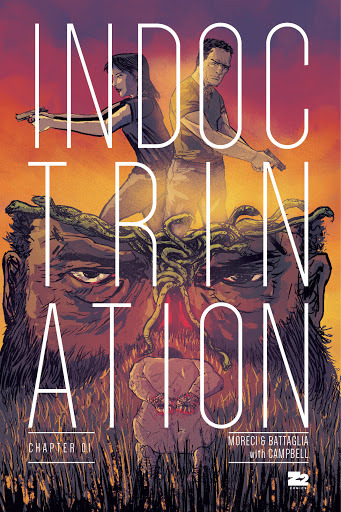
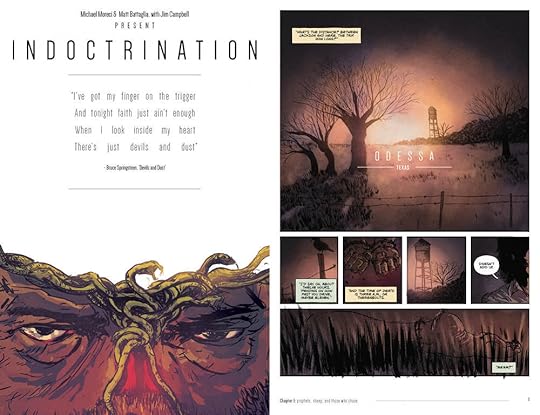
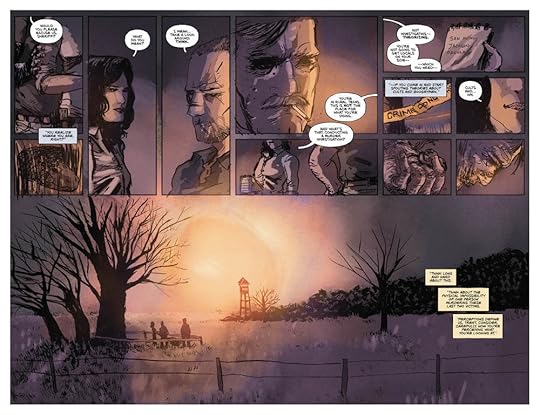

February 17, 2016
On Writing Genre Characters
Somewhere in the early aughts, everyone started talking about how their story is “really about the character.” It become most pervasive in genre fiction—be it TV, comics, novels, whatever—where accentuating the human story—i.e. stressing that the story is really about the struggles of the people involved—made the higher concepts more palatable to mainstream audiences. Which, ultimately, is great—it doesn't take too hard of a look to realize that works of genre—sci-fi and horror especially—have erupted across the mainstream. From Walking Dead to Star Wars to Man in the High Castle and everything in-between (including DC and Marvel's television/film efforts), genre fiction is everywhere. And, still, when we talk about genre fiction—and, on my side of the table, when you try to pitch genre fiction—the crux of what makes the story work relies, heavily, on character. But, somewhere along the way, the role of character within the context of genre has lost its focus—what makes characters so rich and compelling in genre fiction, tackling big, high-concept ideas and themes, has taken a backseat to the mundane/ordinary, and the latter is not a formula for the best genre fiction or the best character work.
Let me explain.
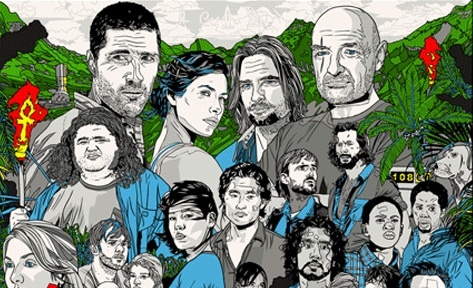
To me, this reliance on character as a way to translate genre fiction to contemporary mainstream audiences has its roots in the show Lost. Just to disclose myself: I adore Lost. It's one of my favorite TV shows of all time. Despite its underwhelming ending, it took me on an amazing journey for five solid seasons—it had adventure, heart, big ideas, incredible performance, smart philosophies, wicked time travel, and it did, on the whole, some pretty amazing things, especially when you consider it was on network television. Lost, though, represents the first big breakthrough of genre fiction into the mainstream, beating Battlestar Galactica by a narrow margin. And what people gravitated towards—amidst the time travel, mysterious hippy cults, polar bears, crazy mysteries, etc—were the characters. The cast of castaways, without question, helped that show break through the glass ceiling of genre fiction. They were deeply human with real problems; when they connected it felt very honest; when they failed, it was heartbreaking. I'll always remember so many character moment, like Locke—the grittily determined John Locke—screaming from his wheelchair “Don't tell me what I can't do!” as he was denied participation in an Australian walkabout. It was a revelatory moment that was as equally shocking as it was resounding. Lost, especially those early seasons—delivered countless moments just like this.
But, here's the thing—as good as Lost's characters were, what made them truly memorable is the context they were placed in. And I don't mean the plot, necessarily. What I mean is that, at its core, Lost was telling a profound story of spirituality. The wrestling of the corporeal world (science) with the spiritual world (religion, faith) made for a thematic playground that gave the story depth, soul, and rich uniqueness that helped make Lost the wild success it became.
That, at their core, was what the characters were wrestling with—the redemption of their souls. Lost was never just about a group of castaways dealing with being trapped on a weird island. Right there is the biggest, most important distinction that helps make Lost as special as it is. And that, to me, is where other works of genre fiction falter—they fail to plume that extra depth and make the story about something more.
Making genre fiction and saying “but it's really about the characters” isn't enough. If the story is about an alien invasion, and the character arcs are them dealing with the alien invasion, something is missing. What about the alien invasion makes these specific characters so unique—why is their story in this context worth telling? Most times, what we end up seeing is characters falling back on the mundane. One of the characters is dealing with the recent loss of his/her spouse; another character is a dealing with being an alcoholic. These are fine character routes to take, don't get me wrong, but they need a richer context. Again, going back to Lost—sure, the character arcs weren't completely original all the time. But whatever they were dealing--their ordinary struggles--were propped up on the richer context of this spiritual journey they were placed on, whether they liked it—and accepted it—or not. You need something deeper going on that heightens the characters' experiences in context of the story.
Admittedly, this is something I aim for in all of my work. Take for instance my Boom Studios! series Burning Fields (co-written by Tim Daniel, art by Colin Lorimer, colors by Joana LaFuente, letters by Jim Campbell). On the surface, Burning Fields is a procedural horror story about a monster that's possessed a cult of murderers to stoke the flames of contention in Iraq. A dishonorably discharged military investigator and an Iraqi detective team up to thwart this heart of darkness and defeat the terrifying monster. That, more or less, is the plot. But, underneath that is a story of faith, and redemption, in the face despair. Dana is someone who has lost her faith, lost her capacity to love herself, or others, because of what she's endured in her life; Aban, her partner, is a man who has maintained his faith because of his love and the things he endured in life. Their actions, and growth/transformation over the course of the story, is made richer, I think, because there's something deeper, very intentionally, going on beneath the surface. Hemingway once said the stories are life glaciers—10 percent above the surface, 90 percent below. I take that insight to heart.
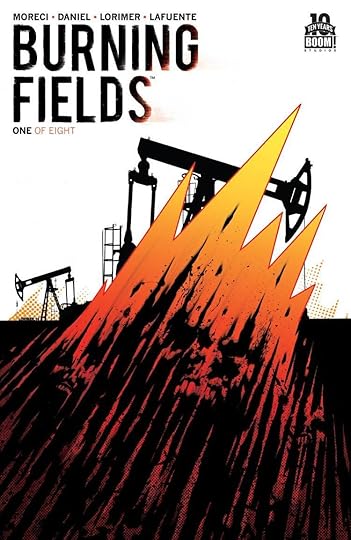
Think, also, about one of the greatest periods in genre fiction—postwar noir in the United States. Believe me, I've seen enough of these films—everything from the staples of this period to the most obscure entires—and there's only a handful of plots utilized in countless noir movies. And that's fine—because, in the end, what makes these stories so special isn't necessarily what happens, it's what it all means.
What you have in these stories, at least in the best ones, is a unsettling look at the underbelly of postwar America. Underneath the veneer of victory over the Axis powers, financial boom, and the newfound suburban sheen, things were really fucked up. You had these desperate men and women aimlessly roaming the cities, their failures magnified by the shadow of national victory. In their failures, they scheme and they plot—they try to make that one big score, securing that jolt they need to get out of their miserable conditions. Of course, their ambitions are destined to fail, condemning them either to death or a further plunge into their existential nightmare of broken dreams and ruined hopes.
I can write about postwar noir for days, but the point is that the best of these films, and books, all had one thing in common. They shared this exploration of postwar bleakness, and this incisive look at the United States, its grimy cities and morally ambiguous characters make the stories all the more richer, compelling, and rewarding.
Another work of mine, Roche Limit, attempted something similar. Its premise was based on the wonder and excitement of space travel and exploration. But, underneath that, was a decaying core of empty promises, a ruined future, and existential crisis. Roche Limit is probably the most intimate alien invasion story I could concoct, and purposefully so. That intimacy helps drive home what was going on underneath, this examination of the human soul—its preservation, value, and how, even as we move into a brave new world of technology, space travel, and other forward-thinking innovations, the world that we must cradle, always, is our own. Our loves, our families, our passions--all the things that define our existence. Roche Limit is the story of a human colony gone terribly wrong—because of hubris, because of forces we can hardly understand or control. What it's about, though, is something much deeper, and because of that, to me, the characters are all the more complex and identifiable. Don't get me wrong--Roche Limit is a messy book, and I don't always hit the mark. But, although the undercurrent isn't always perfect, it does exist--that layer is there that takes it beyond the simple "it's an alien invasion story with characters dealing with an alien invasion."

Roche Limit: Monadic #1 coming March 16! The first volume of the final arc is upon us soon...
I've said this a thousand times, and I'll stick to it forever: If someone asks you what your story is about and you describe what happens, you haven't answered the question. What your story is about—the theme, the plot, what you're trying to say, that richer thing that's underneath the surface, driving the plot and characters—is not the same thing as what happens. There's theme, and there's plot. They are not interchangeable. And just because you have a high concept doesn't mean that the characters can be any less than high concept themselves; they have to be on equal footing and all be connected--story, character, theme.
Point being, genre fiction lets you explore fantastic worlds, big ideas, and show us things we can only begin to imagine. But, ultimately, to make the story reach that next level is the marriage of character and plot with theme enriching them both. Tie it all together, have them work in concert, and you'll have something outstanding.
Okay, that's my two cents. Like what you've read here? Subscribe! There's a little box on the upper right over there--just add your email. No spam, no bullshit. Just updates every now and then. And you can always visit my shop--I just quit my day job so--time to sell my inventory!
Thanks for reading--good luck out there in the writing world!
February 4, 2016
Quitting the Day Job, and the Success Trap
That's right. Turn out the lights, lock the doors, change the passwords on the computers. Come February 19, I'll no longer be a writer bot at my day job, trading in the cube farm for the wide open spaces of...the narrow workspace I've carved out of my house's storage room. But, hell, at least it's my narrow workspace.
What this all means is that, in two weeks’ time, I’ll be a full-time freelance writer for the first time in my life. It’s a dream come true. It’s exhilarating. It’s terrifying. And, truth be told, it’s something I started to believe would never, ever happen.
Like most writers, the path that led me to financial sustainability was not a direct one. Or an easy one. While I've been beyond lucky to enjoy some really cool successes along the way, the path was oftentimes a very challenging one, filled with disappointment, anger, doubt, and flat out heartbreak. But, I did learn a thing or two along the way, and that's what this post is all about. So, let’s cue the Wayne’s World flashback distortion effect and go to the past…
I published my first comic—which also marked my first foray in genre fiction after years of writing stuffy (and bad) literary fiction—in 2006. It was a three page short called Rank and File with art by Keith Burns, my first ever collaborator and still good friend to this day (years later, we worked together on a book called ReincarNATE, which is being developed as a TV series—some big news coming soon on this—and rereleased by Heavy Metal later this year before a new series launches in late 2016). Rank and File was published in a cool UK anthology called FutureQuake, and the experience went well enough that I was able to publish another short in FutureQuake’s sister publication, Something Wicked. Though, for the life of me, I can’t remember what that short was titled. It was with Keith again, I do remember that.
Two years later, I signed my first publishing deal for a full-length graphic novel, and I thought, without question, that this was my big break. I’d be a full-time writer from that point on, getting great gigs, doing my own projects, all the things that make for a stable career.
That didn’t happen. I never even got close.
This idea of the next thing, whatever it was—be it Hoax Hunters, Planet of the Apes, Curse, anything—being the break that would free me from my day job dogged me for the better part of my career. That ambition somehow became the only thing that would validate what I did and why I did it. If I wasn’t writing as a profession—meaning, if it wasn’t my full-time job, if it wasn’t what financially supported my life—then I was a failure. And the more I pinpointed my focus on this idea that I only counted—that my work only counted—insofar as it was my profession, in the strictest sense, started to distort my sense of purpose as a writer. Rather than do work because I loved it, I did it for myriad other reasons—to make a quick payday, to catch the eyes of editor, to engage in this strange arms race that exists amongst my comic peers, where the goal is to secure as many jobs as possible, regardless of the reasons why. And the more this goal slipped away from me, the unhappier I became. I wasn’t a professional writer, and I wasn’t always doing things that I loved. At times, I found myself wondering what, in fact, I did have, and why I was working as a writer at all.
See, being a comics writer can be a very strange thing. We all live in the long shadow cast by Marvel and DC, for better or worse. I don’t mean that as a criticism, at all, but the fact is that they are the surest way to make a stable career, as a writer, letterer, artist, or colorist. They pay the best rates, they’ll never go out of business, they even offer health insurance (to some). There’s more complexities to the comic market and how to make a career, but nothing will change the fact that an exclusive contract with either Marvel or DC will provide a stable income. That opportunity, and their presence, creates a culture where everyone wants in—where everyone needs to get in—and because there’s no real direct path for getting there, what you get is a lot of young creators doing everything and anything they can to catch the eye of the right editor at the right time and get on the right book that propels their career to a whole new level. I know—I was one of these creators for a long time. Too long.
In my persistence, driven by the belief that a job at Marvel or DC would grant me some kind of spiritual deliverance, I found myself competing against myself to no end and competing against my peers, and friends, when there was no competition to be had. I let outside forces determine that terms of my own success, and it was one of the biggest mistakes I ever made.
After years of trying—chasing down editors at cons, sending emails to editors that never got returned, sharing my work with anyone who would look at it, all for the singular goal of becoming a professional comic book writer—I stopped. In part because I was worn out. In part because I’d lost my drive. But in part, also, because I regained some perspective. I had to remember why I wanted to be a writer, what drove me to sit at my computer night after night after night when I could have been doing countless other things, and how I wanted to define myself rather than be defined by someone else.
Now, I can talk about all the sacrifice inherent to being a freelance writer trying to make it. You give up time—time for your family, friends, and yourself; you open yourself up to a world of rejection and criticism from people you don’t even know; you work, intensely, on things you never know will see the light of day or mean anything to anyone. But the point of what I’m writing is to hopefully guide other writers out of the success trap. I fell into, hard. And I’ve seen it happens to my friends as well. It’s not a good place to be, professionally or creatively, but it’s so very easy to find yourself there.
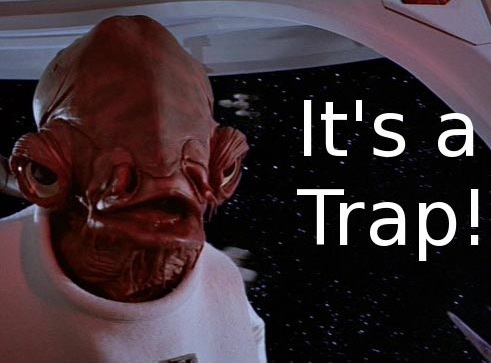
Sorry, I couldn't help myself.
Once I stopped—once I realized the well I’d fallen into and pulled myself out of it—things changed. I started taking on less work and, instead, I pursued projects that were meaningful to me. I learned to shed the term of “comics writer” and simply call myself a “writer,” as there are so many other types of writing I truly enjoy doing. Novels, screenwriting, even journalism. I’m not saying there’s anything bad, or wrong, with being a comics writer. But for me, pursuing one thing, in one way, with one goal in mind created nothing but textbook tunnel vision. And the vision warped my perspective, purpose, and passion.
Now, I’m not brash enough to say that if you simply pursue what you love that everything will work out. I’ve been very, very lucky. The project I’m about to start working on—which is the main reason I was able to leave my day job behind—came to me with equal parts luck, hustle, and dedication. I had years of work and my reputation to fall back on, and combined with a few other factors, I was able to secure a job that is literally a dream made reality. The larger point of what I’m saying, though, is simple: Don’t narrow your journey so that you can only reach one possible destination. And, worse yet, don’t let that destination be decided on by anyone else but yourself. How you define success should be up to you and no one else. The success trap is real—don’t let it ensnare you.
SOME OTHER STUFF
As a way to thank Roche Limit readers, I enlisted some super talented friends to work on a Roche Limit short with me. Set in the Clandestiny time line, this story, called “The Fourth Expedition” was illustrated by Paul Tucker, colored by Dee Cunniffe and Tucker, lettered by Taylor Esposito, and has a cover by Tim Daniel. And, best of all, you can read it for FREE! Here’s the link.
Speaking of Roche Limit—please, please be sure to remind your comic shop to order issue #1. They can do so until Feb. 22nd, and the issue releases on March 16. Only four issues remain until the end!
And hey, more Roche Limit—here’s me holding the oversized hardcover French edition!

December 18, 2015
FORCE AWAKENS THOUGHTS
DO NOT READ THIS UNTIL SEEING THE MOVIE YOU'VE BEEN WARNED WARNED WARNED
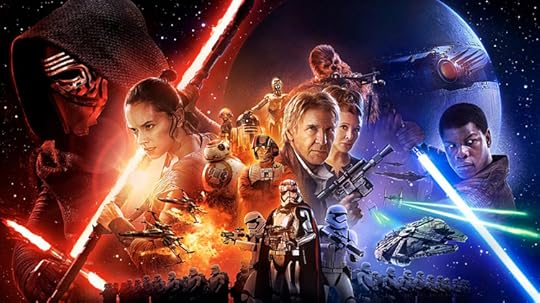
SERIOUSLY, YOU'VE BEEN WARNED THAT SPOILERS FOLLOW
Okay, it happened. After so much waiting and hype and, my God, me literally freaking out about a new movie that opens the Star Wars universe up to new characters, stories, and adventures, it happened. I’ve spent the past few months rereading Star Wars novels and discovering news ones (I highly recommend Lost Stars and Dark Disciple); diving into Clone Wars again; buying a PS4 just to play Battlefront, and because it had a Darth Vader on it; producing my own Star Wars comic with friends out of pure love and releasing it for free (you can read it here!); speculating on Force Awakens, reimagining the prequels, and letting my curiosity roam throughout all corners of the Star Wars universe; playing Jedi adventures with my kids; and so on and so on.
Last night, after going through the six-movie marathon, I finally laid my eyes on a brand new Star Wars movie. And I really, really liked it. I’m not sure I love it, not yet. But I will see it again. And again. And again.
Because I’m a writer, and because I have a very analytic brain (to a fault), I had some thoughts on the movie. Some criticisms, some questions, some ruminations. Now, before we see this as being negative—I want to stress, again—I really enjoyed the movie. But there’s some things about it that were difficult for me, and a I realized how I need to change my outlook to enjoy these new films.
That said, without further rambling, here’s what’s on my mind. Read, and let’s all discuss in the comment section below!
I MISS GEORGE LUCAS
Yup. I said it. Now, just put down the blaster and let me explain…
I’ve always contended that despite how contrived, silly, and at times bad the prequels were (and, don't get me wrong, I actually love these movies), they were decisively their own thing. Lucas was, at no point, trying to duplicate the original trilogy in any way. Sure, there were nods, call backs, and reference, but those movies were going after a look and feel all their own. And I commend Lucas for that. The problem was that Lucas, as a screenwriter, didn’t quite have the ability to deliver the subtleties, nuances, and complexities that the story required (which is why he’s always best alongside strong collaborators, like Kasdan, Kennedy, etc.). There is a great story in those prequels, and that’s what I think fans find most frustrating—we all see the potential that never came to life. The ideas driving the prequels are terrific and essential: Anakin’s inner turmoil, the moral ambiguities of the Jedi order, the brotherly relationship between Obi-Wan and Anakin are all really rich and Star Wars stories. There’s no denying that.
Here’s where my issue with The Force Awakens comes in. I’ll admit, when it was announced that new movies were being made, I was pissed, for a lot of reasons. But mainly, I couldn’t wrap my head around why the story needed to continue—Why here? Why now? What’s the vital thing that needs to be told that would make this story essential, and not fan fiction? Over time, I came to terms with my immediate reaction. In fact, I’ve been practically humming with elation for this new movie. I’ve actually been a bit sad all week, in fact, knowing that the ride leading up to The Force Awakens was coming to an end, because I’d been having so much fun immersing myself in the Star Wars universe. And let me be clear, again—I really, really enjoyed the movie. I thought it was fun, exciting, full of wonder and imagination, I loved the characters, and there were some truly terrific moments.
But I don’t think it answered my question: Why?
There’s a few reasons I feel this way, which I’ll get into if the following sections. But, on the whole, I think the movie failed at justifying why it needed to exist. The ending of return of the Jedi brought the Star Wars/Skywalker story to a satisfying close. Luke saved his father; the rebels toppled the Empire; peace was restored the galaxy, balance was restored to the Force. That was the impression we were all left with after this movie. If you’re going to undo that, or compromise that, I think you need really, really compelling reason to do so, and I don’t think we go that. Did it diminish my enjoyment? A little, but not much. I can’t act like that question, and its answer, doesn’t exist, though.
WHO, OR WHAT, IS THE THREAT?
A secondary reason to this is that I never felt like there was a threat in The Force Awakens. The film essentially had three villains—Kylo Ren, Snoke, and Hux/the First Order. Kylo came off as a sullen, angry man child (a role Driver has perfected) who never feels like he’s much of a danger to any of our characters—I mean, even Hux laughs him off (and not in the way Tarkin controlled Vader, at all). When he goes into his rages, I don’t want to it undercut by a scene of stormtroopers walking the other way. It feels less like passionate rage, then, and more like “oh boy, Kylo’s having another temper tantrum, let’s head this way.” And then he gets his ass handed to him by Rey, who learned the Force like ten minutes ago.
As for the First Order? Another Death Star, which is a threat we’ve seen bested twice already. And we don’t get much from Snoke at all. I have a theory on who he is, but what we’re given, in the movie itself, isn’t all that threatening or frightening. As we move forward, I don’t get a sense that there’s that much to for any protagonist—be it Finn, Luke, or Rey—to be worried about. I could be proven wrong in time, but right now, the conflict doesn’t feel all that compelling or unique.
WHERE’S THE GRAVITAS?
Every Star Wars movie has its Force Sherpa—Qui-Gon, Yoda, Obi-Wan. Now, I’m not saying FA needed to give us a replication of this, but some moment where the action slowed down and took a moment to really acknowledge the Force, what it means, and the role its playing in this movie (it is called The Force Awakens, after all) would have been nice. I think we were all hoping to get that from Maz Katana, but we didn’t. Her role wasn’t bad, but it wasn’t good either. And I think, ultimately, this is a JJ problem. He doesn’t seem willing to deliver gravitas unless it’s dealing with death or daddy issues. By placing Maz in a silly setting—it was more or less a casino on Mos Eisley—and obfuscating her moment in quips, we really got a diminished version of what could have been a powerful scene that glued the Force elements of the movie together. I mean, the words she said as a voiceover in one of the previews held more weight than they did in the actual movie. This was the moment, to me, where the film could have talked seriously about the Force and why it’s important to this story, and that opportunity was lost.
THAT SECOND ACT
A hallmark of a JJ movie is moving the chess pieces around too much. He makes his characters come together, then diverge, then come together again, and now they have to go here, and they reconnect with that other character, etc. way too much. Having watched the marathon leading up to FA, one of the remarkable things I rediscovered is the leanness and wonderful simplicity of the plots. They are so neat but somehow so dynamic at the same time. Empire is a marvel of screenwriting—arguably one of the best mainstream movies ever written. FA spends a lot of the second act having its characters run around not knowing what the hell they’re doing. It reminded me of a video game like Assassin’s Creed, which are often times called “go fetch” games, because you spend so much time running around the game’s word, tracking down or a person, an item, a weapon, whatever. Han, Finn, and Rey having to go to Maz to get to the Resistance was a stretch to begin with (though would have been more palpable had the scene with Maz been more satisfying) and then having all the character diverge--and having them sold out by a spy/mole for the second time in the movie—added up to a whole bunch of convulsion. The momentum of the jaw-dropping first act really stalled out here, and I think if the film had more clarity in the ideas driving it, it would helped smooth out this stretch.
SPEAKING OF MYSTERIES…
Rey's secret origins...
You know, this is such a JJ thing. Everyone has to have a mysterious backstory that they don’t want to talk about but is crucial to the plot. Again, think of the neatness of A New Hope. You walk away from that movie knowing everything you need to know. But JJ loves his character mysteries. And he also loves his pop culture duplications, which is why maybe, in Episode VIII, we'll hear Luke tell Rey “I’m your father.”
R2’S SADNESS COMA
Stop it. He’s a robot.
WHAT IN THE HECK IS HAPPENING IN THIS GALAXY?
No, for real. What’s happening here? From what I understand, given the information we’re given in the crawl, the Republic is reformed, ruling at least a good chunk of the galaxy. Okay, check. And the First Order is opposing them in some capacity. But do they have at least some galactic systems on their side? A home planet that’s more than the new Death Star? Who’s funding this movement? How are they robbing babies for Stormtrooper indoctrination? What is the nucleus of this whole thing? And the resistance—you can basically ask the same questions about them (minus the baby-robbing thing). But also, more importantly, if they are the fighting force that’s opposite the First Order, then that pits them with the Republic. So wouldn’t they just be the army of the Republic? The battle lines are brought up, but they’re never clearly explained. The movie kind of drops it after the crawl, and we’re never really given a sense of place or an answer as to what happened after Return of the Jedi to cause this galactic turmoil. When did the First Order start? We certainly don’t need the politics of the prequels, but I think clearer battle lines were needed. Which, again, returns to the point I started with—what’s going on with the Star Wars universe that this story needs to be told? And this raises another question without an answer, making it harder to justify its reason for being.
BUT I STILL LOVED SO MUCH OF IT
I really, really did. The characters are instantly lovable, BB-8 was terrific, so many beats hit just the right mark. I’ll keep saying how much I enjoyed the movie and will see it multiple times in the theatre to prove my allegiance to its enjoyment. But…buuuuuuuut. I can’t act like I have some nagging questions. I can’t act like, ultimately, I need to train myself to enjoy this installment—and most likely future installments—in a way that’s different from episodes I-VI. And that’s okay. It’s still Star Wars. It’s still strange creatures, life-affirming philosophy, lightsaber battles, great characters, and on and on.
Star Wars fans, we’re home.
Now, I’m going to give one theory. Scroll way down if you want to read it. Otherwise, you can happily stop reading here and hit the comments. Let's talk Star Wars!
NOW, IF YOU REALLY HAD GUTS
Here’s what you do:
You return to mid-cholorians. And no, I’m not joking. Here’s the thing—I think that Snoke is probably Darth Plageius. If so, what’s Plageius’ hallmark? He can make life. Anakin was an immaculate conception. Born of midi-chlorians. Therefore, he was created by Plageius. Being as such, his entire line needs to be destroyed. All the Skywalkers must die, and the line must end. Rey isn’t a Skywalker—she’s the real chosen one who will bring balance to the Force by helping Luke kill his real father (in a sense) then kill him, Kylo, and Leia.
The story will never go there—it’s far too dark—but hey, it’s a theory.



